Foucault,
Neoliberalism,
and Beyond
Foucault,
Neoliberalism,
and Beyond
Edited by
Stephen W. Sawyer and
Daniel Steinmetz-Jenkins

London New York
Published by Rowman & Littlefield International, Ltd.
6 Tinworth Street, London, SE11 4AB, United Kingdom
www.rowmaninternational.com
Rowman & Littlefield International, Ltd. is an affiliate of Rowman & Littlefield
4501 Forbes Boulevard, Suite 200, Lanham, Maryland 20706, USA
With additional offices in Boulder, New York, Toronto (Canada), and Plymouth (UK)
www.rowman.com
Selection and editorial matter 2019 by Stephen W. Sawyer and Daniel Steinmetz-Jenkins.
Copyright in individual chapters is held by the respective chapter authors.
All rights reserved . No part of this book may be reproduced in any form or by any electronic or mechanical means, including information storage and retrieval systems, without written permission from the publisher, except by a reviewer who may quote passages in a review.
British Library Cataloguing in Publication Data
A catalogue record for this book is available from the British Library
ISBN: HB 978-1-78660-376-0
Library of Congress Cataloging-in-Publication Data
Names: Sawyer, Stephen W., 1974- editor.
Title: Foucault, neoliberalism, and beyond / edited by Stephen W. Sawyer and Daniel Steinmetz-Jenkins.
Description: Lanham, Maryland : Rowman & Littlefield International, 2019. | Includes bibliographical references and index.
Identifiers: LCCN 2018057362 (print) | LCCN 2019006466 (ebook) | ISBN 9781786603784 (electronic) | ISBN 9781786603760 (cloth : alk. paper) | ISBN 9781786603777 (pbk. : alk. paper)
Subjects: LCSH: Foucault, Michel, 1926-1984Political and social views. | Neoliberalism.
Classification: LCC JC261.F68 (ebook) | LCC JC261.F68 F69 2019 (print) | DDC 320.51/3dc23
LC record available at https://lccn.loc.gov/2018057362
 The paper used in this publication meets the minimum requirements of American National Standard for Information SciencesPermanence of Paper for Printed Library Materials, ANSI/NISO Z39.48-1992.
The paper used in this publication meets the minimum requirements of American National Standard for Information SciencesPermanence of Paper for Printed Library Materials, ANSI/NISO Z39.48-1992.
Contents
Stephen W. Sawyer and Daniel Steinmetz-Jenkins
Michael Behrent
Serge Audier
Daniel Zamora
Aner Barzilay
Dotan Lesham
Duncan Kelly
Claudia Castiglioni
Luca Paltrinieri
Judith Revel
Stephen W. Sawyer and Daniel Steinmetz-Jenkins
A conversation took place in 2012 at the University of Chicago between the Nobel prize winner Gary Becker and two prominent scholars and specialists of Foucault, Franois Ewald and Bernard Harcourt. Their dialogue concerned Foucaults writings on American neoliberalism and Gary Beckers economics in particular.
The title of this volume and its emphasis on moving beyond the question of a supposed Foucauldian neoliberalism is designed to do precisely that: to explore Foucaults treatment of neoliberalism as a particularly fertile and complex moment in the history of the set of ideas and interpretations associated with liberalism and neoliberalism. Such a perspective, therefore, also seeks to historicize the very debate around Foucaults relationship to neoliberalism since the late 2000s, suggesting that a critical interpretation of this
In 2009, historian Michael Behrents Liberalism without Humanism: Michel Foucault and the Free Market Creed, 19761979 gave new consistency to the debate by providing a historically grounded and sobering account of the ways that Foucaults interest in economic liberalism in the second half of the 1970s had combined with his earlier anti-humanism.
These arguments received an unusual amount of attention for an academic debate, as evidenced by the reception of his argument in the pages of the Washington Post . The debate seemed to feed off a sudden sense of urgency: Could neoliberalism be such a pernicious and overwhelming force that even those many thought to be an important source of resistance against it had actually contributed to neoliberalisms rise? Was Foucault not only unhelpful in combatting neoliberalism, but actually seduced by it and complicit in its twenty-first-century hegemony?
Zamora was certainly not alone in responding yes. Jos Luis Moreno Pestaa and Geoffroy de Lagasnerie both argued that Foucault was either convinced by the neoliberal discourse or tacitly accepted it.
These at times sensationalist, but also increasingly sophisticated, attempts to investigate Foucaults relationship to neoliberalism hardly settled the
To be clear, what follows does not seek to take a stand in these debates. Rather, we interpret their intensity as a sign of the urgency of reckoning with the legacy of the intellectual politics of and around liberalism and neoliberalism in the last third of the twentieth century. This volume, therefore, explores Foucaults engagement with key neoliberal texts with some historical distance while embracing the increasing political necessity of developing a sophisticated historical understanding of the period. It may therefore be helpful to begin by establishing a few relatively objective assessments of Foucaults engagement with neoliberalism.
First, no doubt because of his tremendous influence across the social sciences and humanities, the ambiguity of Foucaults relationship to neoliberalism has found a particularly fertile terrain in our contemporary political and intellectual climate. But, if Foucault has once again played a starring role in critical investigations of our recent intellectual past, he has certainly not been alone. These studies have been part of a growing cottage industry devoted to histories of a perceived present crisis, penned by scholars on all sides of the political spectrum, seeking to locate where things went off the rails.
Second, Foucaults specific interest and treatment of neoliberal texts themselves was relatively short-lived and quite precise. The actual discussion of the variety of forms of neoliberalism as such was almost entirely restricted to the year or two surrounding the lectures on biopolitics at the Collge de France in 19781979. This fact poses a specific challenge for elaborating a sophisticated intellectual history. In response, the authors in this collection have employed a range of interpretive strategies. Some of the chapters have established connections between his discussion of neoliberalism and other parts of his work, even reaching back to the 1950s. Others have reached into the context within which Foucault was writing, such as the rise of the second left in France and beyond or the global perspective of the Iranian Revolution. And still others have explored the political legacy of these concepts and how they developed in the work of other social theorists such as Pierre Bourdieu.
Finally, whether or not Foucault actually embraced, was optimistic toward, apologized or critiqued neoliberalism, he never offered anything approaching an obvious endorsement of neoliberal ideas in his interviews or other writings. At the same time, as opposed to his more explicit refutations of certain social scientific schools or categoriessuch as some specific Marxist categories or schools of psychoanalysisFoucault never explicitly stated his disagreement with some of the key neoliberal texts and approaches that he discussed during this brief period. Whether or not either was necessary to demonstrate his sympathy or rejection of neoliberal ideasespecially considering the brevity of his treatment of this question, as opposed to his long-term dialogue with Marxism and psychoanalysis, for exampleit would seem the result has been that any complex treatment of his relationship to neoliberalism requires an unusually high degree of interpretation and contextualization. Once again, both of these features make this subject particularly rich for developing a better understanding of the intellectual heritage of the last third of the twentieth century around questions of liberalism and neoliberalism.

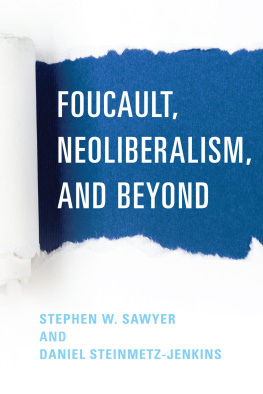
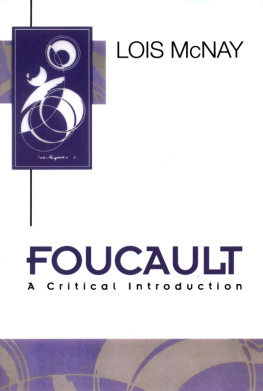

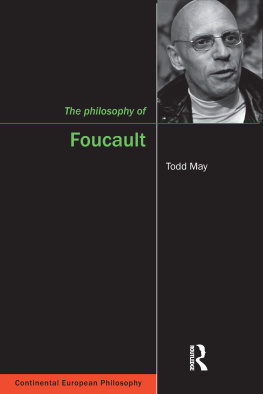


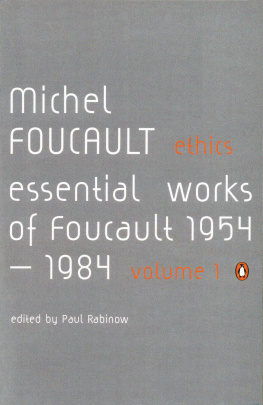
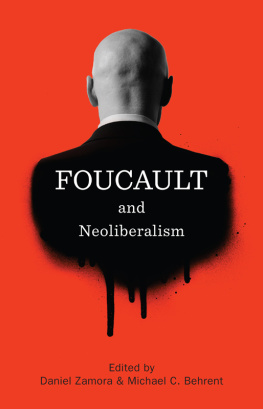
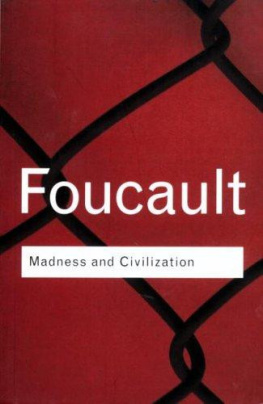



 The paper used in this publication meets the minimum requirements of American National Standard for Information SciencesPermanence of Paper for Printed Library Materials, ANSI/NISO Z39.48-1992.
The paper used in this publication meets the minimum requirements of American National Standard for Information SciencesPermanence of Paper for Printed Library Materials, ANSI/NISO Z39.48-1992.